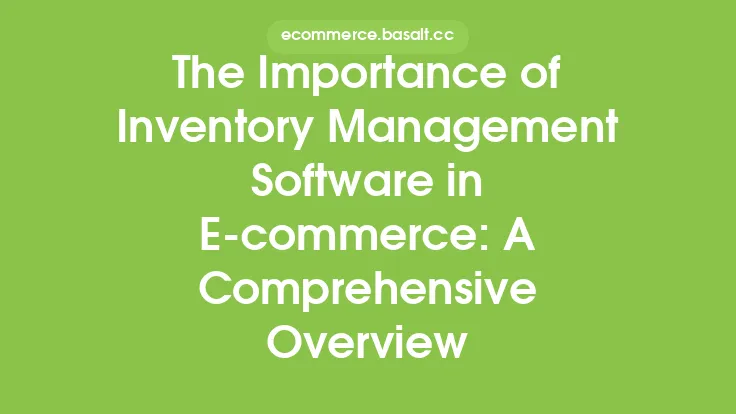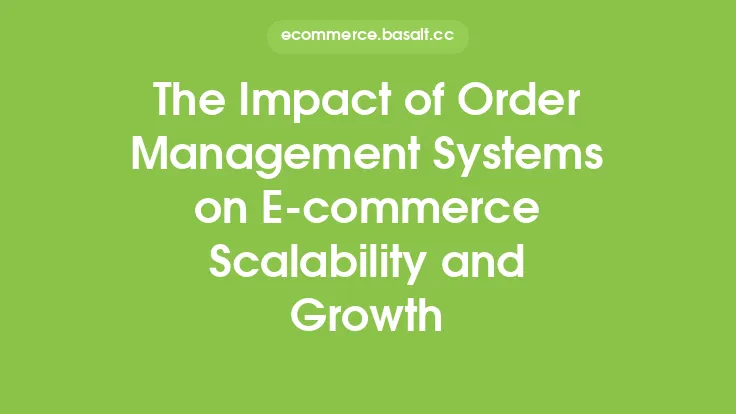In today's fast-paced and competitive e-commerce landscape, having a scalable and flexible e-commerce platform is crucial for businesses to stay ahead of the curve. As the online shopping landscape continues to evolve, e-commerce platforms must be able to adapt to changing consumer behaviors, technological advancements, and growing business needs. A scalable and flexible e-commerce platform enables businesses to respond quickly to market changes, expand their customer base, and increase revenue.
What is E-commerce Platform Scalability?
E-commerce platform scalability refers to the ability of an e-commerce platform to handle increased traffic, sales, and data without compromising performance. A scalable e-commerce platform can accommodate growing business needs, such as increased product offerings, expanded customer base, and higher transaction volumes. Scalability is critical for e-commerce businesses, as it ensures that the platform can handle sudden spikes in traffic, such as during holiday seasons or special promotions, without crashing or slowing down.
What is E-commerce Platform Flexibility?
E-commerce platform flexibility refers to the ability of an e-commerce platform to adapt to changing business needs, such as new product lines, marketing campaigns, or sales channels. A flexible e-commerce platform allows businesses to make changes quickly and easily, without requiring significant IT resources or costly customizations. Flexibility is essential for e-commerce businesses, as it enables them to respond quickly to market changes, test new ideas, and innovate their business models.
Benefits of E-commerce Platform Scalability and Flexibility
The benefits of having a scalable and flexible e-commerce platform are numerous. Some of the key benefits include:
- Increased revenue: A scalable e-commerce platform can handle increased traffic and sales, leading to higher revenue and business growth.
- Improved customer experience: A flexible e-commerce platform enables businesses to make changes quickly, ensuring that customers have a seamless and personalized shopping experience.
- Reduced costs: A scalable and flexible e-commerce platform reduces the need for costly customizations, IT resources, and infrastructure upgrades.
- Faster time-to-market: A flexible e-commerce platform enables businesses to launch new products, marketing campaigns, and sales channels quickly, reducing the time-to-market and increasing competitiveness.
- Better data management: A scalable e-commerce platform can handle large volumes of data, providing businesses with valuable insights and analytics to inform their decision-making.
Key Features of Scalable and Flexible E-commerce Platforms
When evaluating e-commerce platforms for scalability and flexibility, businesses should look for the following key features:
- Cloud-based infrastructure: Cloud-based e-commerce platforms are more scalable and flexible than on-premise solutions, as they can handle increased traffic and data without requiring significant IT resources.
- Modular architecture: A modular architecture enables businesses to add or remove features and functionality quickly, without disrupting the entire platform.
- API-based integrations: API-based integrations enable businesses to integrate third-party services and applications quickly, without requiring significant customizations.
- Customizable templates: Customizable templates enable businesses to make changes to the platform's design and layout quickly, without requiring significant IT resources.
- Real-time analytics: Real-time analytics provide businesses with valuable insights and data to inform their decision-making and optimize their e-commerce operations.
Best Practices for Ensuring E-commerce Platform Scalability and Flexibility
To ensure that their e-commerce platform is scalable and flexible, businesses should follow these best practices:
- Regularly monitor platform performance: Regularly monitoring platform performance enables businesses to identify potential scalability issues before they become major problems.
- Test and optimize: Regular testing and optimization enable businesses to ensure that their e-commerce platform is running at peak performance and can handle increased traffic and sales.
- Stay up-to-date with the latest technologies: Staying up-to-date with the latest technologies and trends enables businesses to take advantage of new features and functionality, ensuring that their e-commerce platform remains scalable and flexible.
- Invest in employee training: Investing in employee training enables businesses to ensure that their staff has the skills and knowledge needed to optimize and customize their e-commerce platform.
- Continuously evaluate and improve: Continuously evaluating and improving the e-commerce platform enables businesses to identify areas for improvement and make changes quickly, ensuring that their platform remains scalable and flexible.
Common Challenges and Solutions
Despite the importance of e-commerce platform scalability and flexibility, many businesses face challenges in achieving these goals. Some common challenges include:
- Limited IT resources: Limited IT resources can make it difficult for businesses to optimize and customize their e-commerce platform.
- High costs: High costs can make it difficult for businesses to invest in scalable and flexible e-commerce platforms.
- Complexity: Complexity can make it difficult for businesses to navigate and optimize their e-commerce platform.
- Limited expertise: Limited expertise can make it difficult for businesses to take advantage of the latest technologies and trends.
To overcome these challenges, businesses can consider the following solutions:
- Partner with e-commerce experts: Partnering with e-commerce experts can provide businesses with the skills and knowledge needed to optimize and customize their e-commerce platform.
- Invest in cloud-based solutions: Investing in cloud-based solutions can provide businesses with scalable and flexible e-commerce platforms, without requiring significant IT resources.
- Prioritize employee training: Prioritizing employee training can enable businesses to ensure that their staff has the skills and knowledge needed to optimize and customize their e-commerce platform.
- Continuously evaluate and improve: Continuously evaluating and improving the e-commerce platform can enable businesses to identify areas for improvement and make changes quickly, ensuring that their platform remains scalable and flexible.





